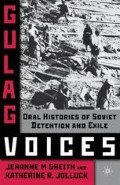Abstract
Feliks Arkadievich Serebrov served four terms in the Soviet forced labor system, two in his youth, for criminal offenses, and two later in life, in connection with his participation in the human rights movement. As a result, he saw more of the Gulag than many survivors and can compare conditions in diverse camp locations and periods.
Access this chapter
Tax calculation will be finalised at checkout
Purchases are for personal use only
Preview
Unable to display preview. Download preview PDF.
Notes
Elena Bonner, Alone Together (New York: Knopf, 1986), 92–93.
Orlando Figes, The Whisperers: Private Life in Stalins Russia (New York: Metropolitan Books, 2007), 468.
See David Gillespie, ed., The Life and Work of Fedor Abramov (Evanston, IL: Northwestern University Press, 1997).
Anne Applebaum, Gulag: A History (New York: Anchor Books, 2004), 465–67.
Applebaum, Gulag, 484–505; Steven A. Barnes, “‘In a Manner Befitting Soviet Citizens’: An Uprising in the Post-Stalin Gulag,” Slavic Review vol. 64, no. 4 (2005): 823–50.
See Arvydas Anusanskas, ed., The Anti-Soviet Resistance in the Baltic States (Vilnius: Duka, Genocide and Resistance Research Centre of Lithuania, 1999).
Timothy Snyder, The Reconstruction of Nations: Poland, Ukraine, Lithuania, Belarus, 1569–1999 (New Haven, CT: Yale University Press, 2003), 164–68
John A. Armstrong, Ukrainian Nationalism, 2nd ed. (Littleton, CO: Ukrainian Academic Press, 1980), 130–65.
Widespread looting and shipping of goods from Germany back home was encouraged by Soviet authorities. See Norman M. Naimark, The Russians in Germany: A History of the Soviet Zone of Occupation, 1945–1949 (Cambridge, MA: Harvard University Press, 1995), 141–89
Catherine Merridale, Ivan’s War: The Red Army 1939–1945 (London: Faber and Faber, 2005), 277–82.
Alec Nove, An Economic History of the USSR (Harmondsworth, England: Penguin, 1972), 181, 240–41.
Jacques Rossi, The Gulag Handbook: An Encyclopedia Dictionary of Soviet Penitentiary Institutions and Terms Related to the Forced Labor Camps, trans. William A. Burhans (New York: Paragon House, 1989), 196.
Mirko Lamer, The World Fertilizer Economy (Stanford, CA: Stanford University Press, 1957), 376.
Alexander Solzhenitsyn, One Day in the Life of Ivan Denisovich, trans. Ronald Hingley and Max Hayward (New York: Bantam Books, 1963). The novel was published in the USSR in 1962, during Khrushchev’s de-Stalinization campaign.
Anna Akhmatova, The Complete Poems of Anna Akhmatova, trans. Judith Hemshemeyer, ed. Roberta Reeder (Boston, MA: Cannongate Press, 1994), 384–94.
Bukovsky was exchanged for the leader of the Chilean Communist Party, Luis Corvalan. See Vladimir Bukovsky, To Build a Castle: My Life as a Dissenter, trans. Michael Scammell (New York: Viking Press, 1979).
Robert Horvath, The Legacy of Soviet Dissent: Dissidents, Democratization and Radical Nationalism in Russia (New York: Routledge Curzon, 2005), 79–80, 84.
See Richard Lourie, Sakharov: A Biography (Waltham, MA: Brandeis University Press, 2002)
Andrei Sakharov, Memoirs, trans. Richard Lourie (New York: Alfred A. Knopf, 1990).
Joshua Rubenstein, Soviet Dissidents: Their Struggle for Human Rights (Boston, MA: Beacon Press, 1980), 30–62.
The Institute of Red Professors was founded in 1921 to create Communist scholars. It was a graduate-level institution specializing in Marxist Social Sciences. See Michael David-Fox, Revolution of the Mind: Higher Learning Among the Bolsheviks, 1918–1929 (Ithaca, NY: Cornell University Press, 1997), 21, 51, 62, 133–91.
Machine-tractor stations (MTS) were established in 1929 as part of the campaign to collectivize agriculture. As of 1933, they had political departments and became a tool for the regime’s social and political control of the peasantry. Robert Conquest, The Harvest of Sorrow: Soviet Collectivization and the Terror-Famine (New York: Oxford University Press, 1986), 181–82.
Copyright information
© 2011 Jehanne M Gheith and Katherine R. Jolluck
About this chapter
Cite this chapter
Gheith, J.M., Jolluck, K.R. (2011). Bridging Separate Worlds. In: Gulag Voices. PALGRAVE Studies in Oral History. Palgrave Macmillan, New York. https://doi.org/10.1057/9780230116283_11
Download citation
DOI: https://doi.org/10.1057/9780230116283_11
Publisher Name: Palgrave Macmillan, New York
Print ISBN: 978-0-230-61063-7
Online ISBN: 978-0-230-11628-3
eBook Packages: Palgrave History CollectionHistory (R0)

